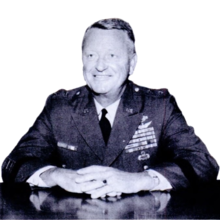John J. Tolson III (October 22, 1915 – December 2, 1991) was a lieutenant general in the United States Army. During the Vietnam War, he helped implement the airmobile concept use of helicopters in combat with the 1st Cavalry Division (Airmobile).[1][2] Tolson credited the U.S Marines for first using helicopters to transport troops into combat in the Korean War, making the ground fight a three-dimensional war, thus freeing troops from the tyranny of terrain.[1]: 4 [3]
John J. Tolson III | |
|---|---|
 John J. Tolson III as a Major General | |
| Birth name | John Jarvis Tolson III |
| Nickname(s) | Jack |
| Born | October 22, 1915 New Bern, North Carolina |
| Died | December 2, 1991 (aged 76) Raleigh, North Carolina |
| Allegiance | United States of America |
| Service/ | |
| Years of service | 1937–1973 |
| Rank | |
| Commands held | XVIII Airborne Corps 1st Cavalry Division Army Aviation Center 325th Airborne Infantry Regiment |
| Battles/wars | World War II Vietnam War |
| Awards | Distinguished Service Cross Distinguished Service Medal (3) Silver Star Medal Legion of Merit (2) Distinguished Flying Cross Bronze Star Medal Purple Heart Air Medal (5) |
Born in New Bern, North Carolina, Tolson attended the University of North Carolina for one year before being appointed to the United States Military Academy in 1933. He graduated from West Point with a B.S. degree in 1937 and was commissioned as an infantry officer.[4][5]
In World War II, John J. Tolson was a member of the 503rd Parachute Infantry Battalion and participated in every jump with that unit,[2] including the recapture of Corregidor in 1945.[6] He was awarded the Silver Star Medal, Bronze Star Medal, Air Medal and Purple Heart.[7] After the war, Tolson was given command of the 325th Airborne Infantry Regiment, 82nd Airborne Division at Fort Bragg.[4]
Tolson graduated from the British Staff College in 1951 and the U.S. Army War College in 1953. He completed fixed-wing and rotary-wing flight training in June 1957. Tolson then served as assistant commandant of the Army Aviation School for two years. He next served as Deputy Director of Army Aviation at the Pentagon until 1961, chief of the U.S. Military Assistance Advisory Group in Addis Ababa, Ethiopia from 1961 to 1963 and then Director of Army Aviation back at the Pentagon from 1963 to 1965. Tolson served as commander of the Army Aviation Center and commandant of the Army Aviation School from March 1965 to March 1967.[4][5][8][9]
In the Vietnam War, Major General Tolson took command of 1st Cavalry Division in April 1967 and served in that capacity till July 14, 1968. Under his command, his division played crucial roles during the Tet Offensive during the Battle of Hue and at Quang Tri City in January 1968. It also participated in the second biggest battle of the war: Operation Pegasus the relief of the Marine Khe Sanh Combat Base in March 1968 where all three brigades engaged the enemy, as well as Operation Delaware, the massive air assault into the A Shau Valley in April 1968.[3][6] He was awarded the Distinguished Service Cross, Distinguished Flying Cross and four more Air Medals.[7][10]
After his Vietnam tour ended, Tolson was promoted to lieutenant general.[2] He was given command of the XVIII Airborne Corps on August 1, 1968.[4] Tolson was also presented the Master Army Aviator badge.[8] He retired in 1973 as deputy commander of the Continental Army.[2]
Tolson died on December 2, 1991, at the age of 76. He was survived by his wife, two sons and a daughter.[2] Tolson was buried at Arlington National Cemetery on December 4, 1991.[11]
His wife Margaret Jordan (Young) Tolson (July 5, 1922 – July 8, 2020) was interred beside him on September 17, 2020.[4][12]
References edit
This article incorporates public domain material from websites or documents of the United States Army Center of Military History.
- ^ a b Tolson, John Tolson (1973). Vietnam Studies: Airmobility 1961–1971. United States Government Printing Office. ISBN 9781931641906.
- ^ a b c d e Bruce Lambert (December 6, 1991). "Gen. John J. Tolson, 76, Dies; Pioneered Army's Helicopter Use". The New York Times. Retrieved May 19, 2012.
- ^ a b Ankony, Robert C (2009). Lurps: A Ranger's Diary of Tet, Khe Sanh, A Shau, and Quang Tri. Rowman & Littlefield Publishing Group. p. 65. ISBN 9780761843726.
- ^ a b c d e "Lieutenant General John Jarvis Tolson, United States Army". Drug and Alcohol Abuse in the Military: Hearings, Ninety-first Congress, Second Session, United States Congress, Senate Committee on Labor and Public Welfare, Subcommittee on Alcoholism and Narcotics. U.S. Government Printing Office. 1971. pp. 17–18. Retrieved 2021-09-24.
- ^ a b U.S. Army Register: Active and Retired List. Vol. I. Washington, D.C.: U.S. Government Printing Office. January 1, 1962. p. 545. Retrieved 2021-09-24.
- ^ a b Roberts (1970). The First Air Cavalry Division Vietnam: August 1965 to December 1969. Nippon Printing Co. p. 36.
- ^ a b "Class of 1937—Register of Graduates". Official Register of the Officers and Cadets. United States Military Academy. 1969. p. 472. Retrieved 2021-09-24.
- ^ a b "Army Aviation Hall of Fame". U.S. Army Aviation Digest. Vol. 22, no. 3. March 1976. p. 30. Retrieved 2021-09-24.
- ^ "John Jarvis Tolson III". Assembly. Vol. LIV, no. 1. West Point, New York. September–October 1995. pp. 164–165. Retrieved 2021-10-08.
- ^ "John Jarvis Tolson". Military Times. Sightline Media Group. Retrieved 2021-09-04.
- ^ "Tolson, John J". ANCExplorer. U.S. Army. Retrieved 2021-09-24.
- ^ "Tolson, Margaret Young". ANCExplorer. U.S. Army. Retrieved 2021-09-24.